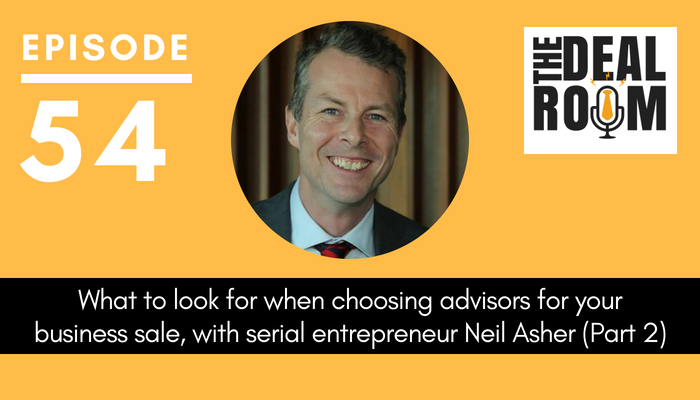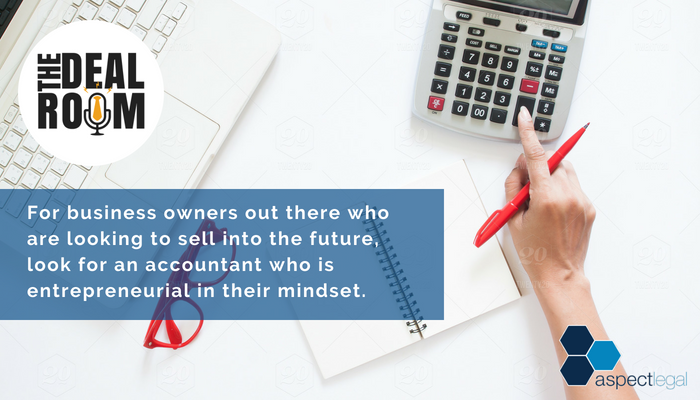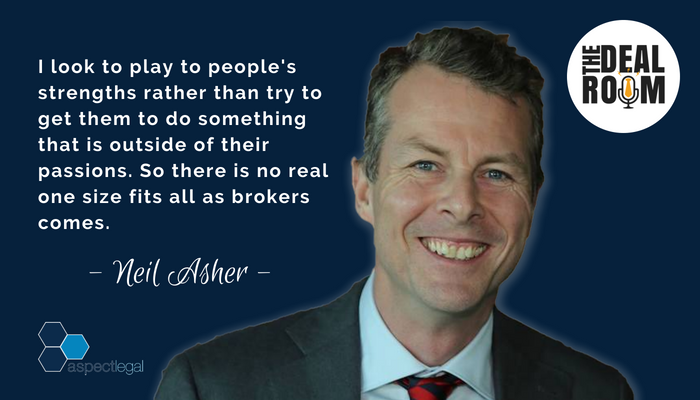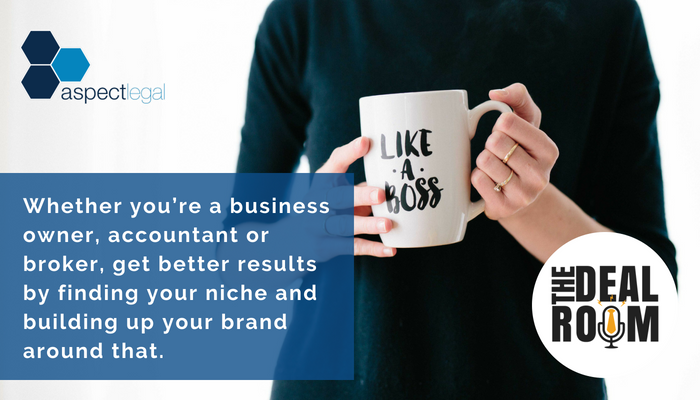
To continue our interview with Neil, today we drill into his encounters with accountants and brokers in the M&A space. We have great tips on what business owners ought to look for when choosing the right advisor to assist you in your business sale. And of course, on the flip side, Neil also gives some excellent advice for our accountants and brokers who want to get ahead and provide more value to their clients.

Episode Highlights:
- Fortuitous perfect timing
- Find an accountant with an entrepreneurial mindset
- 2 things you need to consider when choosing the right business broker
Joanna: Hi, it’s Joanna Oakey here and welcome back to The Deal Room Podcast, a podcast brought to you by our commercial legal practice Aspect Legal.
Welcome to the final half hour of our 2-part series with serial entrepreneur Neil Asher.
If you missed part 1, I definitely recommend that you listen to that. We talked about some of the businesses that Neil built and sold, the lessons he learned from each sale, and the clever approach that got him top dollar for his most successful business sale.
To continue our interview with Neil, today we drill into his encounters with accountants and brokers in the M&A space. We have great tips on what business owners ought to look for when choosing the right advisor to assist you in your business sale. And of course, on the flip side, Neil also gives some excellent advice for our accountants and brokers who want to get ahead and provide more value to their clients.
So keep listening and let’s get started!

Joanna: I just have a number of other very short questions. I’d heard you speaking on a previous podcast about a business that you had bought and then sold that had taught you about some issues in considering the timing of a sale.
Fortuitous perfect timing
Neil: Oh I know what we made you’re referring to okay so I think I know, if not then I think it’s an instructive story nonetheless.
I had a life coach training company called New Insights. And we’d started that business and we grew it very successfully. It was just under eight million dollars a year in turnover in just under two years something like that. So we had great growth of the business which of course brings along a whole raft of different problems.
But I think the thing you’ve remembered is the sale time of the business where we actually come to sell that business. We had and this is a very lucky thing on my part and a very unlucky thing for the acquirer of the business back then. But we had systemized our business, wrapped it up very very nicely and I’ve been searching for a buyer of that business. And it was a life coach training company so I knew needed a particular kind of individual, who was more holistically minded shall we say to buy something like that.
And so we ultimately found a great guy who would suit the business really really well and he had an existing structure that he could bring the two business together and one would feed the other really really well. So we did the deal and back then I did a deal on a vendor finance deal. So we had sold a business for just under a million something like that. Let’s just say a million just for ease of maths.
So we have sold the business for a million. We had done a 20% down, so $200,000 with the rest of the money based upon the cash flow of the business at that time to then pay off using something like 75% of the profits of the business, the gross profits of the business, would go back to me over a period of time to pay off the business. So $200,000 then the rest on the never never to pay off the business including a little bit of interest on back of it. And that was really really good. He was happy with that and I was happy with that. I knew the business was systemised. If nothing else the systems that I’d built would ultimately pay me off the money that I was owed, and of course, we had a personal guarantees in place and that sort of thing. So I knew it was all gonna be good.
Thirty days after we’d signed contracts, there was, this was in the UK, there was a huge exposé done in the media about life coaching, about personal development, about the whole industry as a whole and it was all done around what are the big players in that marketplace a guy called Tony Robbins and a number of other people who had all kind of jumped on the back of the coattails of Tony and built their own life coaching thing. It was all over the place. Massive scandal. You know this doesn’t work. It’s a terrible thing. All that sort of thing and it was massive in the UK.
So that business, of course, tanked as a result of that,went from being extremely profitable, great revenue to doing absolutely nothing in the space of a week. It went from great to holy cow in a week. So that’s a good example of a very fortuitous good timing completely lucky exit on my part. I had a personal guarantee in place with this guy but I couldn’t bring myself to kind of make the guy homeless. I just couldn’t bring myself to do that. So we did end up losing money on it but you know I thought to myself if I had that business what could you do, what could you have done. It’s just one of those things. So he paid me out as much as he could. I thought okay well you know I got out of it some money. But what are you gonna do.
Find an accountant with an entrepreneurial mindset
Joanna: Wow, absolutely what are you going to do. Absolutely right. And I guess I’m interested in your experience with advisers in the area as well. So presumably you’ve dealt with accountants, you’ve dealt with lawyers, you’ve may be dealt with brokers maybe not because you know I don’t know if you still do. So what’s your advice that you can give, let’s just start first with accountants. What are some of the best interactions you’ve had with accountants and what some of the worst that you’ve seen in dealing with preparing for a sale and then and going through the sale process?
Neil: When I was selling that life coach training company we had built the business from zip to eight million in turnover. And me and my wife built that. And I said to my wife, “look you know it’s on a roll, let’s sell it. Let’s sell it as quickly as we can. Let’s just cash out and sell it. We rode a trend in Australia on the back of life coaching.” I said, “let’s sell it.”
So we went to a top four accounting firm and spoke to somebody in their merger and acquisition department. They said, yes we’ll come out and see you, and I didn’t speak to a partner I spoke to somebody at a lower level in the organisation. So they came out to see us and they brought along a partner.
Now I have had the pleasure of working with a lot of people and I am acutely aware that usually, this is going to be a gross generalization, the higher up the food chain you go in organizations like that the the ability to rise that organization like that is usually contingent upon the opinion or the good opinion you have of yourself. It tends to follow that the more arrogant you are about what you do the higher you can rise particularly in very very alpha male female driven environments like mergers and acquisition.
So this lovely lovely gentleman who was very very humble (not), with this other guy, and he was so dismissive of what the business was and what the business had done. And it was very very clear instantly, he berated for instance the guy that brought him, in front of us, berated him for bringing him to see a business like this. Clearly, he wanted a 50 million dollar, a year hundred million dollar a year business, and our shitty 8 million dollar a year business just wasn’t cutting it for him. So that’s my worst experience.
Joanna: So I’m guessing you didn’t hire them.
Neil: No. Although, I will gladly put aside my own opinions of people if I think they could do the best job. I don’t really care how arrogant or obnoxious they are if I think they could do the best job. Whatever I’d just hire it’s all good for me.
But the best experience particularly of accountants are the accountants that are entrepreneurial in their own mindsets. And what I mean by that, well I have found usually there are two types of accountants. There are people who will tell you what you cannot do. And there are people who will tell you what you cannot do and give you solutions that might just work to do it anyway. So depending on what I’m looking for in any given business, you need both.
Some people you need to be extremely narrow in their focus of expertise and you need those people without a doubt for some applications of business. You also need the people who say well you know you can’t do that Neil but here’s a way that you could do it if we did it this way that it might work. You need those two people too.
Generally speaking the first category of people you can hire for $50 or $100 dollars. The second category of people tend to cost $750 or $1000 an hour. So the ability to think creatively about problems seems to certainly within the accounting sphere 10x your worth to any given entrepreneur.
Joanna: I think you know what. That is such a useful insight that you’ve given and I think it’s a way of thinking as well that people can develop if they realise the benefit to their clients and then presumably as you’re talking about there is a benefit to them as well of increasing the value that they provide to their clients. Of being able to think outside of the square and not just come to a rash decisions based on the black and white text that they usually see to be able to think creatively as you put it, which I completely agree with.

2 things you need to consider when choosing the right business broker
Joanna: And how about brokers. I’m really interested in your thoughts about brokers given you clearly were in the industry yourself.
Neil: Yeah. Well brokers you know are a great great bunch of folks. I’ve had some wonderful experience as brokers. Unfortunately with brokers, the thing that you are looking for is two things I guess.
First one is their ability to get your message to the marketplace. So because oftentimes a broker will become your defacto marketing department for your business. And so as an entrepreneur you look at their ability to get your message out. And typically, for businesses if you don’t get enquiries, then no amount of being the best sales person in the world will sell your business. So it all starts in enquiries. So I look at their ability to get the message out first, where are they doing that, how are they doing that, what are they doing outside of that.
Then given that that’s all in place then you want to talk to a broker about the business, and I will always always always look for somebody who’s had consistent result something the type of business that I am selling. Because we all have our own inbuilt preferences and likes and dislikes.
I may be the world’s worst salesperson for selling hairdressing salons for instance. I won’t have a clue how to do that. But put me in front of somebody get me talk about online marketing and e-commerce, and more often than not, at the end of the conversation they’ll be excited about e-commerce, they’ll be excited about what’s happening within the e-commerce frame, because it’s something I’m passionate about. So I look to play to people’s strengths rather than try to get them to do something that is outside of their passions. That’s what I’ve discovered. So there is no real one size fits all as brokers comes.
Brokers are just like real estate agents. If you’re selling apartments, some people for whatever reason are also selling apartments with beach views you know they love the beach. It’s what they live for. I just love going down the beach. Bondi beach is my favourite place to be. Just look at the Bondi. And they naturally sell for you. It’s that natural enthusiasm that comes across and becomes contagious to ultimately make the sale. It’s the same in business. You want that natural enthusiasm to shine through for whatever sphere of business they love to say.
Joanna: So it’s about finding their passion rather than the going the scattergun which can happen. I’ve spoken to lots of people in the industry and who feel they’re in a position, where they feel they just have to be very generic and take whatever businesses are around. But you’re making a good demonstration of the benefits for knitting down which relates to some of the stories actually you were talking about earlier about the you know hitting into the Amazon market into pet probiotics which is really knitting.
Neil: You know the interesting thing is having spoken to a lot of brokers, a reasonable broker will make a sale a month for a business. One sale a month is a reasonable broker okay, which is not ever gonna make them rich. That’s never going to make them wealthy and successful and rich.
And so I’ve always come from the point of view that it is far far better to pick a business, a business niche, restaurants, hairdressers, veterinary surgeons, whatever they’re interested in, and build up their brand around and become the defacto player in that marketplace. I believe that’s a much better strategy for anything. I mean business brokers is one thing, but for anything it’s a much better strategy. Much better to target with a laser like focus than to use, your words, that scattergun approach is never going to get you a great result.
Be the authority within selling café’s, be the authority within doing that and you’ll get a much much better result. Because you get to build a brand around who you are then plays into the hand of, if you’re going to sell your restaurant you have to use whoever it may be, if you’re going to buy a restaurant, you’ve got to go to this person, they’re going to get you the best deal, they get the best restaurants they’re going to get you the best.
Joanna: And as you say better even if you have a bit of passion for that area too right.
Well Neil, can I just say a massive thank you. I’ve really enjoyed discussing all of these various topics with you. I’m blown over by the number of businesses that you have clearly built over time. You’ve just provided insights from so many different perspectives. So thank you for your time. And do you have anything that our listeners might be interested in contacting you for if they’re interested in contacting you.
Neil: Sure I guess. While first and foremost let me just say a huge thank you for having me on the podcast. I have thoroughly enjoyed being on it, and so massive thanks for having me on it, for taking time out of your schedule to ask me some really great questions that I’ve never been asked before. Really insightful questions, so thank you for that.
And if anybody wants to find out, a little bit more, like I don’t do any business brokering or anything like that, but I do share a lot about marketing, about online e-commerce, about how to sell things online through my YouTube channel. And the easiest thing to do is to go to YouTube and just type an Aussie Online Entrepreneurs or Neil Asher into YouTube and you’ll find me on YouTube and you can watch hundreds of videos all about different aspects of marketing and how to make more money selling things online.
Joanna: Yeah and I think the things that you’ve been talking about today are the fundamentals of marketing, but fundamentals of marketing that are as imperative to an Amazon based business as it is to a broking business as it is to an accounting practice as it is to any business that is looking to build to sell. So I thank you and I will be popping over to your YouTube channel and we’ll also be putting it into the notes because you’ve said so many things here that I think are a really universally applicable to our listeners whatever they’re doing at the moment. So thank you.

Joanna: That ends our insightful 2-part series with serial entrepreneur Neil Asher. Our top 3 takeaways from today’s episode are:
Firstly, for business owners out there who are looking to sell into the future, look for an accountant who is entrepreneurial in their mindset. As Neil said earlier, find someone who doesn’t simply tell you what you cannot do. Instead, go for an accountant who goes further, who gives you solutions that might just do it anyway. So for our accountants who are listening in, here’s some helpful insight on how you might be able to add more value to your client – be creative in your approach to problems and take a step beyond mere compliance (what you can and cannot do) and move into an advisory role (where you suggest solutions that might just get things done for your client).
Secondly, in choosing a broker to help you sell your business, Neil talked about 2 important considerations: 1) their ability to get your message out into the market space; and assuming that’s in place, 2) get someone who’s had consistent results in selling the type of business that you are selling. It’s all about playing people’s strengths. There’s no one size fits all.
And lastly, whether you’re a business owner, accountant or broker, get better results by finding your niche and building up your brand around that. Be the authority in that business space, and as we mentioned, better even if it’s an area that you’re passionate about.
Once again, I hope you found this episode helpful. If you enjoyed what you heard today, please subscribe to The Deal Room Podcast on iTunes or on your favourite podcast player. And if you’re already one of our subscribers, thank you! We’d love to hear your thoughts so please leave us a review. This helps us reach more people.
Thanks again for listening in! You’ve been listening to Joanna Oakey and The Deal Room Podcast, a podcast proudly brought to you by our commercial legal practice – Aspect Legal. See you next time!
Our Business Sales and Acquisitions Services
Aspect Legal has a number of great services that help businesses prepare for a sale or acquisition to help them prepare in advance and to get transaction ready. And we’ve also got a range of services to help guide businesses through the sale and acquisitions process.
We work with clients both big and small and have different types of services depending on size and complexity. We provide a free consultation to discuss your proposed sale or acquisition – so see our show notes on how to book a time to speak with us, or head over to our website at Aspectlegal.com.au
Disclaimer: The material contained on this website is provided for general information purposes only and does not constitute legal advice. You should not depend upon any information appearing on this website without seeking legal advice. We do not guarantee that the contents of this website will be accurate, complete or up-to-date. Liability limited by a scheme approved under Professional Standards Legislation














